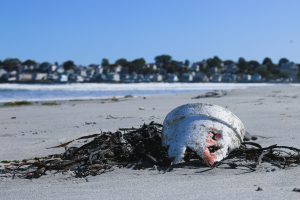Yesterday legislation[1] was laid in parliament which will see Scotland ban some of the most environmentally damaging single-use plastic items – those that are often seen on beaches and littered in our environment. This ban will come into effect in July 2022 and covers single-use plastic cutlery, plates, straws, beverage stirrers and balloon sticks; and food containers and cups made of expanded polystyrene. Importantly, exemptions apply to plastic straws for those who need them for independent living or medical purposes. Scotland is the first UK Nation to ban these items and deserves credit for doing so.

Although a welcome step, we need to make sure that momentum is maintained and ambition increased.
There are additional single-use plastics that should be restricted or banned. Other countries have commitments to ban, for example, plastic condiment sachets, wet wipes, confetti, tea bags, six-pack rings and take-out food containers[2]. The Scottish Government plans to ban further single-use plastic items – let’s make sure it includes all those which are either not needed at all or for which there are practicable reusable alternatives.
We also need to be mindful of unintended consequences and the overall goals – as well as addressing plastics that are littered, we need to reduce our overall consumption of plastics, especially those made of fossil fuels. Plastic is a major contributor to climate change and emissions from the plastic lifecycle threaten the ability of the global community to keep temperature rise below 1.5° C[3]. Our over-use of raw materials in general also needs to be addressed. The sheer quantity of resources extracted, processed and wasted has a massive impact on climate change and biodiversity loss[4] and Scotland’s material footprint is more than double sustainable levels[5].
With this in mind, we need to be wary of, and mitigate against, two possible consequences of the single-use plastic item ban.
First, the substitution of material in single-use items. Although single-use plastic is a particular problem due to the nature of plastic in the environment, single-use in general is wasteful. Non-essential single-use items should be banned irrespective of material.
Second, in encouraging use of more durable alternatives, we need to make sure that such items are used enough times before they are discarded if they are to offer net benefit over single-use in terms of overall plastic consumption. Consumer awareness campaigns are needed and it should be made easy for people to do the ‘right thing’ – for example, reusable cup deposit schemes[6] would both enable people to avoid single-use cups without having to carry a reusable cup around with them, and ensure that the cups are used again and again.
The above is not to take away from the achievement of this week which we should celebrate as a significant step towards moving away from single-use. However, it is only the beginning and more action is urgently needed.
Phoebe Cochrane, Scottish Environment LINK
[1] https://www.gov.scot/publications/single-use-plastics-regulations-draft-guidance-document/
[2] https://www.gov.ie/en/publication/4221c-waste-action-plan-for-a-circular-economy/
[3] https://www.ciel.org/plasticandclimate/
[4] https://www.resourcepanel.org/reports/global-resources-outlook
[5] https://www.zerowastescotland.org.uk/research-evaluation/material-flow-accounts-mfa
[6] For example https://www.spacehive.com/the-cotswold-reusable-cup-scheme
